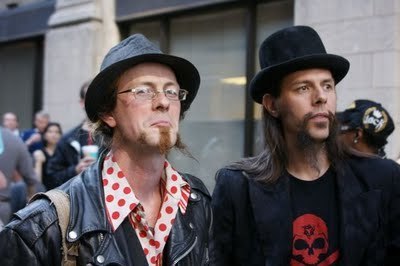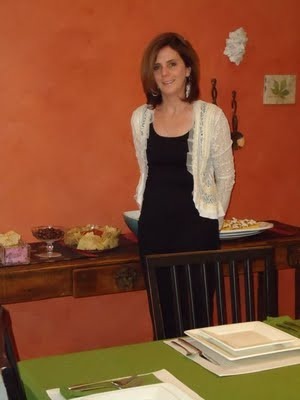Beth Kephart's Blog, page 243
May 13, 2011
"How Genius Works,"
 the Atlantic headline promised, and heaven knows: I am perennially in need of help. So I picked up the May issue and dug in, thinking, Somebody's going to teach me something new here. Somebody's going to say something so smart that I'll spend weeks reexamining my own thinking.
the Atlantic headline promised, and heaven knows: I am perennially in need of help. So I picked up the May issue and dug in, thinking, Somebody's going to teach me something new here. Somebody's going to say something so smart that I'll spend weeks reexamining my own thinking.Not so much. Despite a wonderful concept and a kingly collection of wunderkind specimens—T.C. Boyle on writing the novel, Jennifer Yuh Nelson on developing the villain for Kung Fu Panda 2, Paul Simon on writing songs, Sarah Ruhl and Scott Bradley on writing the stage direction and creating the set for Eurydice, Tim Burton on his Alice in Wonderland, etc.—I never felt as if I moved beyond the surface here. Paul Simon, for example says, "You're going back and forth, words and music. If they come together—your best words with your best melody—well, that's something. That's rare." Frank Gehry speaks this way: "You're bringing an informed aesthetic point of view to a visual problem. You have freedom, so you have to make choices—and at the point when I make a choice, the building starts to look like a Frank Gehry building. It's a signature." Laura and Kate Mulleavy talk about their fashion being "very nature driven."
Perhaps it's just not possible to talk about how an idea emerges, or what it actually feels like to curl the edges and throw the bridges down. Perhaps artists need more than a page to reveal the big process stuff—the glorious cracks, the terrifying fissures. Perhaps talking about making defeats or negates the beauty of the made thing.
Perhaps I'm still out here working in my own inscrutable, untranslatable way.




Published on May 13, 2011 16:44
A Visit From The Goon Squad/Jennifer Egan: Reflections

Novelists are tasked with leaving readers with the grave and glorious illusion that they have been given access to a world, ushered in. This exists, the novelist says. I've seen it. I've been there. Let me show you.
Jennifer Egan's many-prized A Visit From The Goon Squad does not merely render a world. It wends readers through the hallows and hollows of vast geographies, personalities, and zones. Goon Squad is a composite of abutments and abrasions—a savvy, smart, sometimes bitter, often funny suite of thirteen tales about ingeniously interrelated slackers and singers, druggies and parents, inglorious PR mavericks and thieves, people who were young and people who grew old. Time is Egan's primary character, her first concern. How we hope. How we remember. And how, most devastatingly, we age.
It took me many days to read this book, but I'm not sure why. I would read a few chapters, set the book aside, return—not the smartest approach to a book in which it is necessary to place and remember a stream of characters who are minor, then major, then receding, then right back at you again. You have to work at this book, in other words—not because Egan is trying to be difficult, but because Egan is so very smart, and so frequently sly. She's postmodern, if I understand the term. A risk taker, a jokester, a woman who (now so famously) can tell a very touching, humane story through the device of power point slides. Oddly, I was perhaps most moved by the tale delivered through those infamous slides.
Egan can also write a hell of a sentence, and in fact she has written an abundance of them here. I close this post with an example, a description of an undone rocker who we've also known, in pages elsewhere, as a singing tour de force.
Look at what Egan can do:
Nowadays he was huge—from medications, he claimed, both post-cancer and antidepressant—but a glance into his trash can nearly always revealed an empty gallon box of Dreyer's Rocky Road ice cream. His red hair had devolved into a stringy gray ponytail. An unsuccessful hip replacement had left him with the lurching, belly-hoisting walk of a refrigerator on a hand truck. Still, he was awake, dressed—even shaven. The blinds of his loft were up and a tinge of shower humidity hung in the air, pleasantly cut by the smell of brewing coffee.




Published on May 13, 2011 09:45
May 11, 2011
It's like this,
 I said to my friend, Anna. You can either let the negative forces get you down, let them trounce you a little, let them work you over with their own mysterious agendas, or you can stand back, say no, lean toward good.
I said to my friend, Anna. You can either let the negative forces get you down, let them trounce you a little, let them work you over with their own mysterious agendas, or you can stand back, say no, lean toward good.It's the lean toward good that's so exhilarating.
So freeing.
So right.




Published on May 11, 2011 18:24
Find your own voice
 Diagnosed with a cancer that has virulently attacked his vocal cords, Christopher Hitchens continues to provoke, instruct, and elevate with his pieces, especially those he writes for Vanity Fair. In the June issue, in a piece entitled "Unspoken Truths," Hitchens reflects on the physical loss of his voice and the ineffable craft that is the making of a writer's voice. I teach writerly voice. I care about it. I read, then, with great interest.
Diagnosed with a cancer that has virulently attacked his vocal cords, Christopher Hitchens continues to provoke, instruct, and elevate with his pieces, especially those he writes for Vanity Fair. In the June issue, in a piece entitled "Unspoken Truths," Hitchens reflects on the physical loss of his voice and the ineffable craft that is the making of a writer's voice. I teach writerly voice. I care about it. I read, then, with great interest.The whole is so worth reading. Here's a part:
To a great degree, in public and private, I "was" my voice. All the rituals and etiquette of conversation, from clearing the throat in preparation for the telling of an extremely long and taxing joke to (in my younger days) trying to make my proposals more persuasive as I sank the tone by a strategic octave of shame, were innate and essential to me. I have never been able to sing, but I could recite poetry and quote prose and was sometimes even asked to do so. And timing is everything: the exquisite moment when one can break in and cap a story, or turn a line for a laugh, or ridicule an opponent. I lived for moments like that.




Published on May 11, 2011 08:08
May 10, 2011
"Can you make a lot of money as a writer?"
 the young man in the fifth row asked. I'm always asked.
the young man in the fifth row asked. I'm always asked.They want to know, these aspiring writers, if they can make a living at this crazy word stuff, and so we talk about what "living" is, about commercial books and literary ones, about big advances and zero advances, about being one's own best advocate and looking ahead to new books. "You write your book, you advocate for your book, and then you keep creating," I tell them. "A writer's primary job," I reiterate, is to keep dreaming and creating."
But what's a royalty check? they want to know. And when you get them, do you celebrate?
This, my dear readers, is one literary writer's royalty check. Not a whole lot, you say? But consider this: The book was written and the book was made. It contains a part of me, a stretch of days, that might otherwise have been forgotten.




Published on May 10, 2011 13:27
Go where you are wanted, insist on nothing
 Long car drives provide a girl with a chance to think and yesterday, in collecting our son from college, I had that time. A chance to consider my future. A chance to make a decision or two about who I will be, and what might happen next. My career has been a funny thing. And the world: it changes fast.
Long car drives provide a girl with a chance to think and yesterday, in collecting our son from college, I had that time. A chance to consider my future. A chance to make a decision or two about who I will be, and what might happen next. My career has been a funny thing. And the world: it changes fast.As I pondered where my business might go next and where I might go with it, I had this utterly simple, surely quite obvious thought: Go only where you are wanted. Because maybe business is about assertion, persuasion, winning, getting the job. But business is also, ultimately, about doing the job—about working companionably with another. In my line of work—transforming others' knowing or dreams or achievements into meaningful stories and effective publications—words matter, craftsmanship counts, and passion is essential. It's subjective. It's personal. And maybe you can fight your way in through the door, but is that the wisest thing to do if the door doesn't open easily to begin with?
This sounds obvious to you. It sounds obvious to me. But it took a long car drive to ease into the peaceful notion of letting the world come my way, of waiting. I will be missed, or I won't be. I will be needed, or not. But there is only one go-around in this life of ours, and I don't want to spend what's left of mine fighting to be recognized or remembered. Spring is here. There is sun out there, and blooms. That is what is waiting for me at the moment, and I'm opening my door to it.




Published on May 10, 2011 06:10
May 9, 2011
Bringing the kid home
 We're off to collect our son from his very happy college days and steal some time with him before he's off again for his London travels.
We're off to collect our son from his very happy college days and steal some time with him before he's off again for his London travels. The word 'bliss' was made for this.




Published on May 09, 2011 06:55
May 8, 2011
Please Look After Mom/Kyung-sook Shin: Reflections
 Among the many extraordinary young people in my most recent class at the University of Pennsylvania was a freshman from South Korea with a philosopher's soul. K went at projects in his own fashion and earned our lasting respect for the ways in which he'd quietly, politely defend his literary outposts. He moved fearlessly outside the confines of form and foundation to suggest a new approach, at one point earning J's highest encomium, "That took balls, man." K was unafraid of dreaming out loud, unafraid of hoping, unafraid of expressing his deep, abiding affection for his mother. K wrote not of disdain and fractures, but of love and sacrifice, of the "whistle of the wind through the open window." That open window was in our own classroom. He wrote movingly, too, of its walls, its soul.
Among the many extraordinary young people in my most recent class at the University of Pennsylvania was a freshman from South Korea with a philosopher's soul. K went at projects in his own fashion and earned our lasting respect for the ways in which he'd quietly, politely defend his literary outposts. He moved fearlessly outside the confines of form and foundation to suggest a new approach, at one point earning J's highest encomium, "That took balls, man." K was unafraid of dreaming out loud, unafraid of hoping, unafraid of expressing his deep, abiding affection for his mother. K wrote not of disdain and fractures, but of love and sacrifice, of the "whistle of the wind through the open window." That open window was in our own classroom. He wrote movingly, too, of its walls, its soul.What had shaped this young man? I often wondered, and when I read of Kyung-sook Shin's Please Look After Mom, I knew I had to read it—had to see South Korea through the eyes of one of its most famous working novelists.
Mom is the story of lostness—of a South Korean woman who is somehow not right there, with her husband, when the train they are to ride together pulls out of the Seoul Station. The woman had been beset by blinding headaches and some amnesia. She was getting on in age. She had, to be honest, been largely taken for granted. But now Park So-nyo is gone, and desperation sets in as her husband and adult children set out to find her.
We learn the story through the voices of Park's novelist daughter, her eldest son, her husband, and a younger daughter (before hearing, finally, from Park herself). We understand, throughout all the pained and poignant remembering and reassessing, that it is not just that Park's family doesn't know where she is and cannot find her. It's that they may never really have known her at all.
This simply-told story embodies haunting, complex truths. It yields a devastating but gorgeous portrait of South Korea. It reminds us that mothers were children once, mothers have dreams, mothers are wrecked and salvaged by their secrets. This is a book that I didn't want to part with. It's a book that I will read again.
I quote from this letter tucked inside the book, written by the younger daughter. I choose this passage because it is Mother's Day and, while I am not this daughter, I was a daughter. I honor today those things that I will never know fully about my own mom, those things she dreamed and wanted.
I know one thing. I can't do it like she did. Even if I wanted to. When I'm feeding my kids, I often feel annoyed, burdened, as if they're holding on to my ankles. I love my kids, and I am moved—wondering, did I really give birth to them? But I can't give them my entire life like Mom did. Depending on the situation, I act as if I would give them my eyes if they need them, but I'm not Mom.... She didn't have the opportunity to pursue her dreams and, all by herself, faced everything the era dealt her, poverty and sadness, and she couldn't do anything about her life other than suffer through it and get beyond it and live her life to the very best of her ability, giving her body and her heart to it completely. Why did I never give a thought to Mom's dreams?




Published on May 08, 2011 16:24
Greta gives me a rose (Happy Mother's Day)
 We celebrate Mother's Day at St. John's Presbyterian Church with a youth-led service, happy songs, and roses. Today the bells rang, the singers sang, a young poet read, and, toward the end of it all, the youth went up and down the aisles giving roses to their moms. I was talking to the young man beside me at the time, and so my head was turned when I heard young Greta (who is Clara's sister and Paul and Julie's youngest daughter) saying Happy Mother's Day. Wearing her bright smile and her sweet blue dress, she delivered unto me this slender pink rose.
We celebrate Mother's Day at St. John's Presbyterian Church with a youth-led service, happy songs, and roses. Today the bells rang, the singers sang, a young poet read, and, toward the end of it all, the youth went up and down the aisles giving roses to their moms. I was talking to the young man beside me at the time, and so my head was turned when I heard young Greta (who is Clara's sister and Paul and Julie's youngest daughter) saying Happy Mother's Day. Wearing her bright smile and her sweet blue dress, she delivered unto me this slender pink rose.Sometimes the children of the world belong to all of us (or perhaps they always do). Today Paul, Julie, and Clara shared their Greta.
Happy Mother's Day to all who love the children of this world.




Published on May 08, 2011 10:10
Dine In, Help Out: The Day After
 Many of you have kindly sent your your encouragements to me during these Dine In, Help Out days, and so this is my final report back to you: it was a good and right thing to do.
Many of you have kindly sent your your encouragements to me during these Dine In, Help Out days, and so this is my final report back to you: it was a good and right thing to do.Because the fact is that you can spend as much time as you want casting spider webs aside or watching Nick edge new stones into the garden. You can wonder obsessively if the yellow callas detract from the rust callas, if you have any business attempting appetizers, if you are just plain out of your mind for inviting two of the area's top business leaders and their beautiful women into your very modest home. You can wonder and you can worry, and then 6:30 comes, and there's no going back: the party finally begins.
It's not really, in the end, the food that makes a party (thank goodness). No one takes a tour of the garden and judges the stone work. No one searches for spider webs, or if they do, it frankly doesn't matter. People make a party, and last night I had the privilege of introducing two men to each other who share so many things—a talent for dreaming big and acting effectively on those dreams (these men build companies; they build legacies), a distinctly philanthropic lean, a transparent commitment to the families they have built, an abiding love for their fathers, and so much shared interest in farming ways that a good half hour of talk gets given over to the egg-laying-business of chickens.
These men also have incredibly good taste in women, and toward the end of the evening, MA asked if I might talk a little a bit Dine In, Help Out, this May-long initiative sponsored by St. Christopher's Foundation for Children. It's pretty simple, I said. Philadelphia-area residents are inviting friends to dinner in their homes throughout the month of May and encouraging those friends to contribute whatever they might have spent on a restaurant meal that evening to the Foundation. The Foundation in turn is channeling those funds into a Farm to Families program focused on bringing affordable, nutritious food to North Philadelphia, the nation's second hungriest congressional district.
It's all thanks to my friend, Jan Suzanne Shaeffer, who has a heart the color of her very golden hair and who never works in the abstract. She cares about the plight of North Philadelphians because she has taken the time to make them her friends. She is doing good because good is her passion, her happy gift. I'm hugely uncomfortable in any fundraising role, but I did this because I believe in Jan and I believe in this cause. I have worked way outside my comfort zone, these past few weeks, and I can't tell you if the food I cooked was any good because I was too nervous to eat it. But because of Jan I had, in last night, an evening I'll never forget.




Published on May 08, 2011 04:53



